Mitch Berger: A Father-Son Super Bowl Dream Come True – 2023 Inductee Spotlight
February 7, 2024By Jason Beck
At the beginning of the film American Underdog: The Kurt Warner Story, which depicts the life of the Super Bowl-winning NFL quarterback and MVP, a series of stats are presented to illustrate the long odds of reaching pro football’s peak.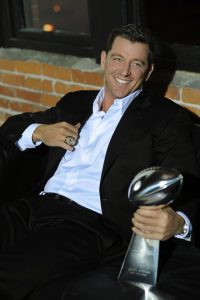
“Over a million athletes play high school football each year in America, each with a dream of their own,” the film’s star Zachary Levi narrates in the opening sequence. “Only about 5% of them make it to college ball. And only 1% of those get drafted into the NFL. Most don’t stay in the league for more than three years. Only a select few will ever play in the Super Bowl…”
It’s a great film and a better story, don’t get me wrong, but here’s the thing: here in BC we have our own Super Bowl underdog story and it’s arguably even better.
You could make a movie out of Mitch Berger’s story. In fact, someone should. His story is better than most football movies made to date.
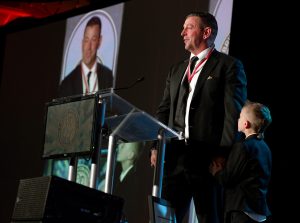 We heard it first-hand last May at the BC Sports Hall of Fame’s Honoured Member Reception where Mitch shared a bit of his story with the gathered crowd delivering a speech on behalf of his fellow 2023 inductees. In my 20+ years working for the BC Sports Hall of Fame, I’ve heard plenty of speeches, but I’ve never seen a crowd held in such rapt wonder as Mitch spoke. Looking around the room at various points you saw people smiling, laughing, jaws dropping in amazement, heads shaking incredulously, many sobbing. Except for the odd punchline, you could hear a pin drop most of the time as the room clung to Mitch’s every word. It was quite something I won’t ever forget. If you weren’t lucky enough to be there in person with us last May, you can watch video of it here on the BC Sports Hall of Fame’s Facebook page (Mitch’s portion begins at the 60:00 min mark): https://www.facebook.com/watch/live/?ref=watch_permalink&v=255994367096892
We heard it first-hand last May at the BC Sports Hall of Fame’s Honoured Member Reception where Mitch shared a bit of his story with the gathered crowd delivering a speech on behalf of his fellow 2023 inductees. In my 20+ years working for the BC Sports Hall of Fame, I’ve heard plenty of speeches, but I’ve never seen a crowd held in such rapt wonder as Mitch spoke. Looking around the room at various points you saw people smiling, laughing, jaws dropping in amazement, heads shaking incredulously, many sobbing. Except for the odd punchline, you could hear a pin drop most of the time as the room clung to Mitch’s every word. It was quite something I won’t ever forget. If you weren’t lucky enough to be there in person with us last May, you can watch video of it here on the BC Sports Hall of Fame’s Facebook page (Mitch’s portion begins at the 60:00 min mark): https://www.facebook.com/watch/live/?ref=watch_permalink&v=255994367096892
When Mitch and I sat down for an extended interview in BC Place in April of last year leading up to his BCSHOF induction, he went into even greater detail of his remarkable rise to the pinnacle of pro football. As American Underdog made clear, very few Americans make it all the way, but even fewer Canadians make it there, just a handful all-time from BC, and almost none the way Mitch did battling adversity every step of the way, including injuries and being cut numerous times. He picked himself up and fought back more times than you can count and finally near the end of his fairytale NFL career he won the Super Bowl with the Pittsburgh Steelers, his father’s hometown team, just like they’d both dreamt of years earlier.
ESPN sportscaster Steve Levy, a friend of Mitch’s, told him that every year somebody at the Super Bowl has a story that isn’t told enough, but is the best story at that particular Super Bowl.
“He said to me, ‘You have the best story of anybody here and nobody knows it,’” Mitch recalled being told in 2009.
His is a remarkable tale that deserves to be better known by British Columbians and Canadians in general. With Super Bowl LVIII upon us, let’s look back at Mitch Berger’s unlikely climb to the NFL and a Super Bowl championship, one of the greatest underdog stories in BC sport history.
Born in Kamloops, Mitch’s family moved to North Delta when he was just over a year old. Mitch’s dad Don grew up in Homestead, Pennsylvania, a suburb just a few miles southeast of Pittsburgh. Don grew up a huge Steelers fan and served in the US Air Force beginning at age 17. A few years later he was posted to a radar base in Sioux Lookout, a small Indigenous community in northwestern Ontario where he met his future wife Evelyn, who was working there as a waitress. A few years after marrying Evelyn in 1960, they moved to BC and began raising their family. There, he passed on his love of Steelers black and gold to his youngest son, who became a Steelers fan when he was just three years old.
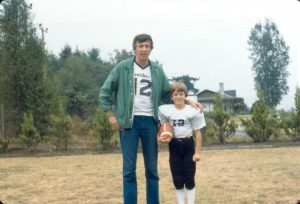 “As early as I can remember I was watching Terry Bradshaw, Mean Joe Greene, all those guys,” said Mitch in a 2023 interview with the BC Sports Hall of Fame. “While everyone else in Canada was doing hockey, I didn’t know to skate. I went to one hockey game, hated it. My dad didn’t like it either. Wanted no part of it. My dad raised me like an American in Canada. I did basketball, football, and baseball.”
“As early as I can remember I was watching Terry Bradshaw, Mean Joe Greene, all those guys,” said Mitch in a 2023 interview with the BC Sports Hall of Fame. “While everyone else in Canada was doing hockey, I didn’t know to skate. I went to one hockey game, hated it. My dad didn’t like it either. Wanted no part of it. My dad raised me like an American in Canada. I did basketball, football, and baseball.”
Mitch also played soccer and at a young age Don noticed his son was one of the few kids who could get the ball up on corner kicks. So at age six, Don began teaching Mitch how to kick a football from a handbook he found. Not long after, to help his son practice kicking he set up uprights in their backyard.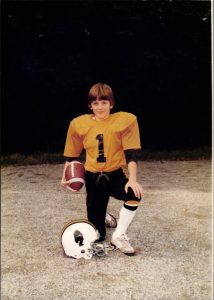
“That’s where it began for me on the mean streets of North Delta,” Mitch chuckled.
For years after, the goalposts in the Berger family’s backyard all but served as a North Delta landmark.
“Anyone that knows me at all knows me from the goalposts in our backyard. My dad put them up. My teammate’s dad was a big fisherman and gave us a big fishing net, so we put that up behind to catch my kicks. People still message me on social media about them. Everybody that knows us from North Delta still talks about the kicking posts and seeing me and my dad kicking in the yard.”
Mitch played community football in North Delta (Don served as a coach and association president) from a young age until Grade 11. A gifted athlete, he was much more than just a kicker, playing quarterback and safety, something he did on all of his football teams until college. Surprisingly though, his first love was actually basketball.
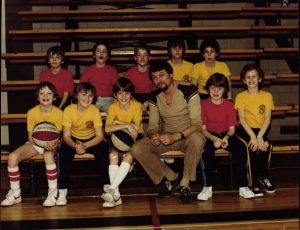 “I wanted to be an NFL player all my life, but basketball was what I did all day every day.”
“I wanted to be an NFL player all my life, but basketball was what I did all day every day.”
When Mitch transferred to North Delta Secondary for his Grade 12 year, bringing with him all the best players from his community football team, he led the Huskies to the semifinals of the BC High School Provincial Championships, which was the closest he came to winning a BC high school title in football. But Mitch did win a BC title, just in a different sport.
While Mitch and a couple other teammates were finishing up the football season, the Huskies basketball team started off the season slowly. When the football players bolstered the basketball lineup, the Huskies caught fire going undefeated the rest of the season and winning the 1990 BC High School Boys AAA Provincial title defeating Richmond in the final.
By that time Mitch was attracting some interest from SFU, UBC, and some smaller schools to possibly play quarterback, safety, and of course kick. If he’d had his way, he would have picked basketball to pursue, but his instincts told him focusing strictly on kicking was going to be the path that took him farthest.
“I just knew that I was pretty good at all of those and I could have a pretty good college career, but I knew I had no chance to be in the NBA or NFL. The one thing I was far and away above everybody was kicking. So I chose the thing that wasn’t my favourite thing to do, but that I was best at.”
His goal was still the NFL, but first he had to get the attention of a US college. Easier said than done in the early 1990s before the internet, social media, and Youtube.
“Today you can do well now in high school football here and somebody will see you. But we weren’t seen back then.”
 Mitch’s dad put together an expensive highlight video of Mitch kicking and then sent copies to colleges all over the US. Even though he was ranked as the best kicker his age in Canada by scouting magazines, no one took Canadians very seriously then and the only school that made him an offer was Chadron State College in Nebraska. And it wasn’t even a great offer: a half-scholarship to red shirt his first year and possibly play in his second.
Mitch’s dad put together an expensive highlight video of Mitch kicking and then sent copies to colleges all over the US. Even though he was ranked as the best kicker his age in Canada by scouting magazines, no one took Canadians very seriously then and the only school that made him an offer was Chadron State College in Nebraska. And it wasn’t even a great offer: a half-scholarship to red shirt his first year and possibly play in his second.
“That was all I got and that was only because of my dad.”
As he did every year since he was 13, in his Grade 12 year Mitch went down to the Ray Pelfrey kicking camp at Pacific Lutheran University in Washington State. Pelfrey was a former NFL player who brought in NFL kickers as camp instructors. Mitch often won the camp competition and Pelfrey had developed a rapport with the young Canadian. He asked Mitch where he was planning to go to university the next year.
“UCLA? Alabama? Where ya going?”
“Chadron State College.”
“Where is that?!” Pelfrey asked, having never heard of it. “Let me make some calls.”
Pelfrey got Mitch a full ride at Tyler Junior College in Tyler, Texas, east of Dallas, where Mitch would be the starting punter, kicker, and kickoff specialist right away.
It was nothing if not at least a start. But Mitch learned quickly that east Texas is a long way from North Delta, BC when you’re 18 years old and have never been away from home on your own before.
“I went down there sight unseen and cried myself to sleep for the first week,” he recalled.
It didn’t get any better on the field either.
“We had a scrimmage and I shanked seven out of eight punts off my foot that landed in the bleachers. I was just so nervous and short arming it and out of my element. I remember the guys in the van after saying, ‘They brought you all the way from Canada to do that!’”
Mitch wanted to go home and get as far away from Tyler, Texas as possible. But his dad wouldn’t let him give up so easily and gave him a pep talk over the phone. It helped. By the third game of the season, Mitch was 9-for-9 on field goals, with a 47-yard game winner against the number one team in the country. He ended up being selected an All-American as a field goal kicker and First Team All-Conference as a punter and kicker.
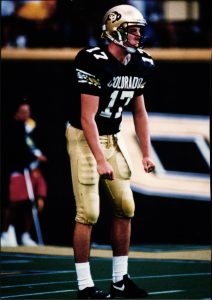 “Then every school in the country came after me.”
“Then every school in the country came after me.”
He chose the University of Colorado Buffaloes, who offered him a scholarship to punt and kick for them. Colorado was a top NCAA Division I school who had been selected by most as national champions in 1990. Berger stepped right in and thrived under coach Bill McCartney.
“He was very harsh, very rough, and a very mean coach, but he built me into what I was. He helped make me into a pro.”
Mitch earned First Team All-American honours in 1992 and he turned heads with a big leg who could pound booming punts and kick-offs deep into opposition territory giving any team he was on an edge in field position. With the NFL rule changes that made kickoffs more important, Mitch’s path appeared set as a kickoff guy who could punt.
In 1994 he was drafted by the NFL’s Philadelphia Eagles in the sixth round, 193rd overall.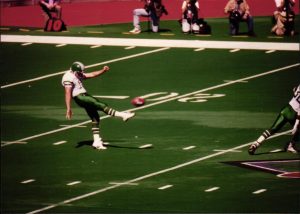
“Finally made it to the NFL. Everything I ever wanted to be from when I was six years old in North Delta.”
He made his NFL debut with the Eagles on September 4, 1994, in a 28-23 loss versus the New York Giants at Giants Stadium.
“I got food poisoning three nights before my debut ordering Chinese food. I almost didn’t play in it because I was so dehydrated and I was so sick. But I did play and I was excited, nervous, and a little scared. It was a big deal.”
Mitch punted six times with a longest boot of 52 yards. His family was watching him live out his dream back home in BC on TV.
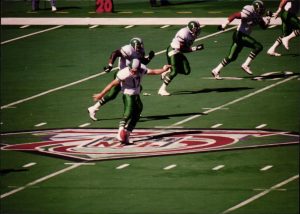 Remarkably, Mitch wasn’t the only BC kicker on the Eagles at that time. Victoria’s Eddie Murray, a 19-season NFL veteran, who was coming off a Super Bowl win with Dallas the previous season, was the Eagles field goal kicker.
Remarkably, Mitch wasn’t the only BC kicker on the Eagles at that time. Victoria’s Eddie Murray, a 19-season NFL veteran, who was coming off a Super Bowl win with Dallas the previous season, was the Eagles field goal kicker.
“Eddie was sort of mentoring me. He helped me actually because I used to do this hop, skip, and a jump on the kickoffs in college and Eddie taught me to do a better, most consistent kickoff that I did the rest of my career. Eddie was there for me and helping me.”
Two BC kickers on an NFL team at the same time. That must be the only time in NFL history that’s ever happened. Murray and Mitch still keep in contact and exchange Christmas cards each year to this day.
By Mitch’s fifth game (a win over Washington), he was just starting to get comfortable. Then the Eagles suddenly cut him.
“They said, ‘We’re 4-1 and we just beat the 49ers 40-8 and we’re a Super Bowl contender. We can’t have a rookie punter anymore. You’re going to cost us down the road.’
Mitch hadn’t set the league on fire those first five games, but hoped he’d at least be given the opportunity to get settled.
“I was punting like a rookie. I didn’t lose us any games, but head coach Rich Kotite felt we were a contender. He cut me and at one point they lost seven games in a row, didn’t even make the playoffs or have a winning season. I’m sure my punting would have put us over the top if they kept me,” he laughed.
Mitch obviously was devastated, but as he had already done several times just to get this far and as he would many more times in the future, he picked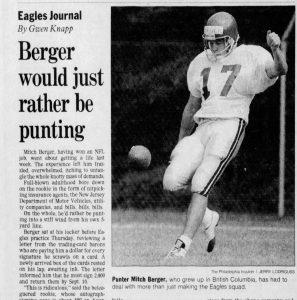 himself up and went back to work. For the next two years, Mitch bounced around trying to find a team.
himself up and went back to work. For the next two years, Mitch bounced around trying to find a team.
“Everything I did to get to that point for me to get cut, that could be it for some people. But it wasn’t it for me. I believed I could make it. I believed I could do it. Over the next two years I got cut five more times on four different teams. The Bears twice.”
In addition to being drafted by the Eagles, at the same time the Winnipeg Blue Bombers had also drafted Mitch (first round, 12th overall) and still owned his CFL rights.
“I called the Blue Bombers and said, ‘I’ve been cut by everyone in the NFL, could I maybe come out there?’ And they said, ‘We’ll give you $200 to be on the practice squad because Bob Cameron’s punting really well.’ I said, ‘I’m not going to do that.’
So Mitch came back home and worked the morning shift pumping gas at a Petro Canada under the Alex Fraser Bridge for seven dollars an hour. That was rock bottom.
“That was as low as I felt,” he said.
And if it wasn’t, then the moment when his high school football coach pulled in with the football team probably was.
“They were making fun of me while I was filling the bus up with gas. Saying things like, ‘I thought you were the big star football player, you’re pumping our gas?!’ I’ll never forget it. It humbled me, but I was humbled enough pumping gas at six in the morning at Petro Can.”
 Despite it all, Mitch refused to give up. After his shifts at the gas station, he and his dad would go out to the field and kick. Then he went to the gym and worked out. He continued to do this every day to be ready on the slim chance he got a call. One day the phone rang. It was the Chicago Bears.
Despite it all, Mitch refused to give up. After his shifts at the gas station, he and his dad would go out to the field and kick. Then he went to the gym and worked out. He continued to do this every day to be ready on the slim chance he got a call. One day the phone rang. It was the Chicago Bears.
“And they signed me for a week. I went in there, told them my story, it made it into USA Today, it was great. Then after a week, they cut me again. But I made more money in that one week than I made for three months at Petro Can.”
Unfortunately, it did mean he was back pumping gas again. After short stints with the Eagles, Cincinnati Bengals, Bears, Indianapolis Colts, Green Bay Packers, and the Bears a second time went nowhere, there weren’t many options left to try.
“After that I thought it was pretty much over. I didn’t think I had another chance. But my dad came up with a plan.”
Beyond continuing to kick and work out daily, that offseason Mitch and father Don found the phone numbers of all 30 NFL teams’ player personnel directors and special teams coaches. This was still pre-internet so that wasn’t such an easy task to accomplish at that time.
“I either talked to or left a message with all 60 of them, asking them to give me a chance. As my dad liked to say, I offered my services to every single team in the NFL. And I got two calls back.”
One was from the Houston Oilers and the other was from the Minnesota Vikings. Mitch went with the Vikings. The odds weren’t in his favour, but when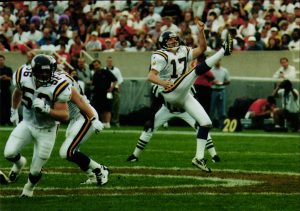 were they ever? Minnesota’s special teams coordinator, Gary Zauner, liked Mitch, but the Vikings already had three punters and three field goal kickers in training camp. Zauner told him: “I talked them into bringing you in. You have two weeks to beat out six guys or you’re going to be the one cut.”
were they ever? Minnesota’s special teams coordinator, Gary Zauner, liked Mitch, but the Vikings already had three punters and three field goal kickers in training camp. Zauner told him: “I talked them into bringing you in. You have two weeks to beat out six guys or you’re going to be the one cut.”
“I gathered up all my stuff and actually moved to Minnesota and said I’m going to beat everybody out.”
Mitch ended up winning the kickoff job and on the last day of camp, he won the punting job too.
“I went there, I beat everybody out and then I played 15 years straight in the NFL.”
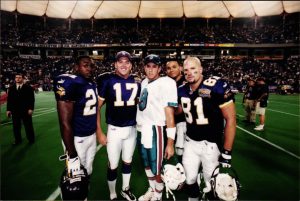 In his six seasons (1996-2001) in Minnesota, Mitch established himself amongst the NFL’s elite kickers. With a career 42.9-yard punting average, he often found himself among the NFL’s top-ten in this category as well as punting yards and longest punt, his 75-yarder in 1999 a career-high and third longest in the league that season.
In his six seasons (1996-2001) in Minnesota, Mitch established himself amongst the NFL’s elite kickers. With a career 42.9-yard punting average, he often found himself among the NFL’s top-ten in this category as well as punting yards and longest punt, his 75-yarder in 1999 a career-high and third longest in the league that season.
In 1998, Mitch was twice named the NFL’s special teams player of the week and set an NFL record of 40 touchbacks off kickoffs that still stands to this day. At the same time, Vikings kicker Gary Anderson had a perfect season never missing a field goal or extra point (each of which was held by Mitch) as the Vikings went 15-1 and made the NFC Championship game. Mitch and Anderson were so successful that the NFL intervened and outlawed the balls they used at home games and instead instituted the ‘K-ball,’ an unaltered ball to make things fair for all teams on game days.
“That started because of me. Because of how many touchbacks I had and how bad we used to cheat with the balls. Putting them in the dryer and blowing them up like rugby balls. As long as your quarterback could hold it and throw it and ours Randall Cunningham had huge hands, it didn’t matter how big it was. Once in a while, I run into old-time kickers and we talk about it. They still give me heck and blame me for the K-balls!”
Despite being a first alternate for the Pro Bowl (teammate Anderson was selected and brought Mitch along as his guest), the Vikings chose not to sign Mitch to a long-term deal, not fully believing in him yet.
 The next season Mitch performed so well he was named to his first of two Pro Bowls and his first of two selections as an All-Pro. Then all the teams in the NFC wanted him. He figured if the Vikings were waffling he should explore his options.
The next season Mitch performed so well he was named to his first of two Pro Bowls and his first of two selections as an All-Pro. Then all the teams in the NFC wanted him. He figured if the Vikings were waffling he should explore his options.
“I was actually flying to Green Bay when Vikings coach Dennis Green called me and said, ‘Get off the plane. We’re going to make you the highest paid kicker in the world.’”
Mitch signed a five-year deal with the Vikings for $6 million US or $1.2 million a year. At the time that was the biggest contract for a punter or kicker in NFL history.
“For one or two years to be the highest paid kicker in NFL history, that’s something I’m proud of. To go from where I was and how many cuts.”
At the same time, Mitch became known as one of the best tackling punters in the league. Over his career, he accumulated 20 tackles, a very high number for a kicker.
“I prided myself on my tackling. I like hits. I liked to tackle guys. But it also meant I either didn’t kick it good or we didn’t cover good, so it was never good that I was tackling.”
In university at Colorado he’d take part in all the defensive back hitting drills and in the NFL besides playing scout team quarterback, he also did some hitting drills as well.
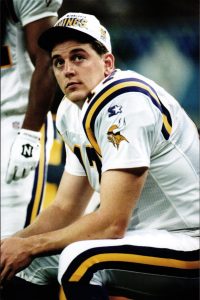 “I always wanted to hit with the guys because I wanted to cover. I didn’t want to kick and trip somebody, I wanted to cover downfield and hit somebody. And that’s another way to make it with your teammates, you knock somebody out.”
“I always wanted to hit with the guys because I wanted to cover. I didn’t want to kick and trip somebody, I wanted to cover downfield and hit somebody. And that’s another way to make it with your teammates, you knock somebody out.”
One time in a preseason game against the Bears, Mitch chased down a returner who was running down the sideline and hit him so hard the returner’s cleats flew over his head into the bench. Mitch had effectively de-cleated him.
“I stood over him and said, ‘You just got knocked out by a freakin’ kicker!’ The guys on my team heard that and went craaaaazy! Threw me up in the air. You do that, that’s how you get your respect. That’s how you get to be one of the boys. So I prided myself on doing things like that.”
Beyond just having a long leg, it was things like this that earned Mitch respect not usually accorded to punters or kickers. He stands as one of the few punters to ever make the All-Madden team.
Usually kickers keep to themselves, but Mitch was always among the most popular guys on almost every team he played on.
“I was known as a pretty fun team guy. I got along well with everyone. When I was in Minnesota, me and Robert Smith we used to run that entire city. I used to run all the parties, parties at my place all the time. I had my own TV show. Only guy on the team with his own TV show and I was a punter. Also had a radio show.”
Another couple pieces of trivia from Mitch’s time with the Vikings that many outside Minnesota probably won’t know. One was that Mitch’s ballboy for four years was a teenaged Larry Fitzgerald Jr., who went on to become one of the greatest receivers in NFL history in 17 seasons with the Arizona Cardinals. The two would reunite as teammates in 2007 with Arizona.
“He was my ballboy that the Vikings gave me at training camp. I taught him how to catch punts and hit bombs over his head and make him chase around balls for me. Then he became Larry Fitzgerald.”
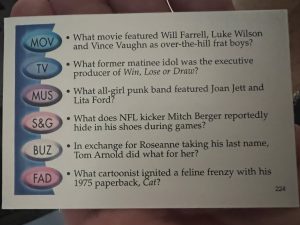 The other piece of trivia is literally a Trivial Pursuit question: “What does NFL kicker Mitch Berger reportedly hide in his shoes during games?”
The other piece of trivia is literally a Trivial Pursuit question: “What does NFL kicker Mitch Berger reportedly hide in his shoes during games?”
The answer?
A Snickers bar, of course. To this day in Minnesota, Mitch is still called ‘The Snickers Kicker.’
How it came about was that Mitch was often hungry on the sidelines during Vikings home games. Today they’d have shakes and energy bars, but back in the late-1990s they didn’t. He liked to snack on a Snickers bar while golfing, so he started bringing one to games. He kept it in his spare running shoes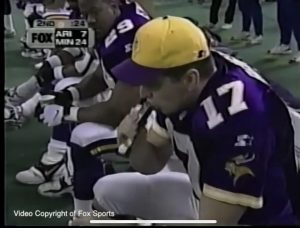 under the bench.
under the bench.
“One broadcast, I kicked one through the back of the end zone and ran off the field slapping everyone’s hands. I went to sit on the bench, looked around, grabbed my Snickers bar, took a bite, and put it back in my shoe, and John Madden was commentating about it the whole time on TV. To be honest with you, that’s probably the thing I am known most for: being the Snickers Kicker.”
Departing Minnesota for one season in St. Louis in 2002, Mitch then produced three strong seasons in New Orleans with the Saints. He was named to his second Pro Bowl while there in 2004. He was still one of the top punter/kickers in the NFL, but by 2005 years of overuse and the massive amount of torque generated on his lower body especially during kick-offs had led to periodic nagging groin 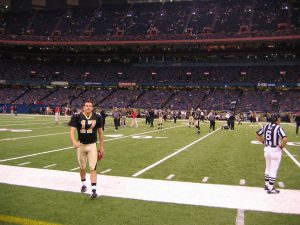 issues. And then with one kick, everything snapped—literally—and resulted in a major, potentially career-ending injury. He tore his lower abdominal, tore his groin, tore his rectus femoris (hip flexor) muscle off the bone, and his pubic bone separated to the point it needed to grow back together. Mitch underwent hernia surgery to repair the area and faced a 14-month recovery with no guarantees he’d ever kick again.
issues. And then with one kick, everything snapped—literally—and resulted in a major, potentially career-ending injury. He tore his lower abdominal, tore his groin, tore his rectus femoris (hip flexor) muscle off the bone, and his pubic bone separated to the point it needed to grow back together. Mitch underwent hernia surgery to repair the area and faced a 14-month recovery with no guarantees he’d ever kick again.
The worst part? The Saints, figuring there was no way back from this, cut him.
For most, this would have been the end of the NFL road, but as we’ve already seen Mitch is not most athletes.
“I thought my career was over again. But I kept at it, I kept at it.”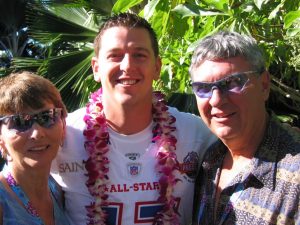
Once he had recovered enough from the surgery, he began rehabbing every day. Soon he was out kicking again by himself out on a lonely field. Words his dad had told him years ago and that he’d followed throughout his career now became even more important.
“My dad used to always say, ‘It’s what you do when no one’s looking that counts, not when everybody’s watching.’ That’s a big thing I say to my son now too.”
So he built himself back up, was training seven days a week, and was ready to give it another shot for a new club in the 2007 NFL season. He kept kicking by himself, hoping to get a call and had all but given up when NFL training camps were well underway. Everyone had written him off.
 Gary Zauner, the Vikings special teams coordinator, who had been the one to convince Minnesota to give Mitch the chance he needed back in 1996, had just finished a season with the Arizona Cardinals as their special teams coordinator. He called the Cardinals urging them to give Mitch a shot. Finally, they called Mitch. He worked out for them, they signed him after he beat out several other experienced kickers, and he managed to get into five games. He kicked okay, but readily admitted he was still not fully himself after the surgery. Arizona chose not to resign him.
Gary Zauner, the Vikings special teams coordinator, who had been the one to convince Minnesota to give Mitch the chance he needed back in 1996, had just finished a season with the Arizona Cardinals as their special teams coordinator. He called the Cardinals urging them to give Mitch a shot. Finally, they called Mitch. He worked out for them, they signed him after he beat out several other experienced kickers, and he managed to get into five games. He kicked okay, but readily admitted he was still not fully himself after the surgery. Arizona chose not to resign him.
So it was back to the empty field and the lonely gym in Scottsdale, Arizona where Mitch was now living. He refused to give up and kept working out.
“I literally had my 70-year-old mom with a torn rotator cuff from softball throwing me underhands in the fields in Arizona. My dad couldn’t do it anymore due to Parkinson’s. I had everybody in my family helping me. Pretending I was on an NFL field, pretending I was in an NFL stadium. For the last four years of my career I didn’t get into an NFL training camp. I was by myself on a field, with friends, with family, anybody who would help me, and then the Pittsburgh Steelers called.”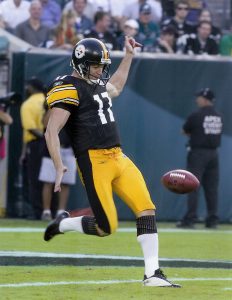
The Pittsburgh Steelers. The lifelong favourite team of his Pennsylvania-born father, who had passed his love of the black-and-gold onto his son. A Hollywood screenwriter couldn’t have come up with what happened next.
Two weeks into the 2008 training camp, Pittsburgh’s punter blew out his knee. They auditioned other punters but they didn’t kick well or mesh with the team. Mitch was brought in almost as an afterthought as an experienced veteran to push the young contenders. He ended up winning the punter job outright.
“I knew how to work a room a lot better than the others obviously. I punted pretty well and the guys liked me and so they decided to sign me.”
 Steelers head coach Mike Tomlin, who had only been on the job for one season by then, kept joking that Mitch was older than he was (which actually wasn’t true; Tomlin was three months older than Mitch), but they decided to give Mitch a shot.
Steelers head coach Mike Tomlin, who had only been on the job for one season by then, kept joking that Mitch was older than he was (which actually wasn’t true; Tomlin was three months older than Mitch), but they decided to give Mitch a shot.
On opening day in Pittsburgh, Mitch flew his dad in to watch the game. It was a truly special moment for both father and son. Don showed Mitch the tiny house he grew up in, took him to the old local pub they used to watch Steelers games at on weekends, and introduced his son to all sorts of people he knew including a childhood friend he grew up playing street football with.
“I grew up here in BC, the son of a man from Pittsburgh. But we knew nothing about Pittsburgh. He never talked about it that much. But we got to go back to Pittsburgh and I got to bring my dad to opening day with his childhood friend. And I thought that was the coolest thing I could ever do.”
Mitch helped the Steelers defeat the Houston Texans 38-17 that day at Heinz Field as they opened what would end up being a strong 12-4 regular season campaign, good for first in their division.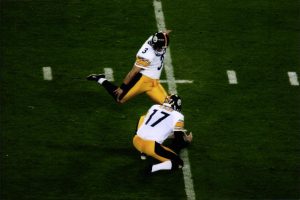
Mitch began the season punting well and enjoying the opportunity to learn about Pittsburgh with his father. During the Steelers bye week in October, Mitch came back to Vancouver and threw a couple parties at the Players’ Chophouse bar and restaurant that he co-owned (and located just a stone’s throw from the BC Sports Hall of Fame, right beside BC Place on Beatty Street). On his return to Pittsburgh, he sat through several cramped, connecting flights and was admittedly dehydrated. At his first practice back, he tore his hamstring on the second-to-last punt of the day.
“On the last punt, I just tried to tough it out and get through it, but I tore the other hamstring.”
At the same time, the Steelers long snapper, Greg Warren, who Mitch teamed well with on punts, blew his knee out and was done for the season. The Steelers brought in a new snapper who threw fire but was often wild and inconsistent forcing Mitch to work harder to get his punts off in time before they were blocked. Mitch did his best trying to play through it all for a few weeks, but every week he’d almost heal up and then reinjure himself. One game he could barely move and on a couple plays actually hurt the team. In early November the Steelers decided they wanted to place him on injured reserve, which would have made Mitch ineligible to play for the rest of the season.
 Mitch felt he just needed three weeks to go back to Arizona, work with his rehab team, and get healthy again. He begged the Steelers not to put him on injured reserve, but to release him from his contract instead. Then, once he was healthy, they could re-sign him for the rest of the season. Coach Mike Tomlin and GM Kevin Colbert liked that idea but warned him that if the guy that they brought in to replace him for three games played well, there was no guarantee they would bring Mitch back as the Steelers punter.
Mitch felt he just needed three weeks to go back to Arizona, work with his rehab team, and get healthy again. He begged the Steelers not to put him on injured reserve, but to release him from his contract instead. Then, once he was healthy, they could re-sign him for the rest of the season. Coach Mike Tomlin and GM Kevin Colbert liked that idea but warned him that if the guy that they brought in to replace him for three games played well, there was no guarantee they would bring Mitch back as the Steelers punter.
“I said, ‘If the new guy comes in for three weeks and kicks butt, I’ll take my chances.’”
So Mitch was released and went back to Scottsdale to rehab his ailing hamstrings. Meanwhile, the punter the Steelers brought in to replace Mitch, Paul Ernster, was one of the guys Mitch had beat out in training camp. Over three straight home games at Heinz field with the cold and wind and a wild long snapper, Ernster struggled mightily.
“He died for three weeks. They couldn’t wait for me to come back. I probably needed another week to be fully ready, a fourth week, but they brought me back after three.”
Mitch was signed to a new contract for the rest of the season as the Steelers only lost one more game the rest of the way on their run to the division title.
“I wasn’t in the groove I was in before the injuries and the snapper change, but my holding [on field goals] to make game winners was big. It was ‘don’t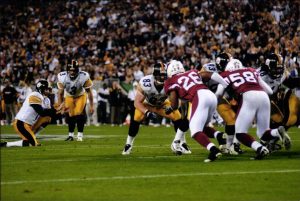 lose games for us.’ Be a veteran and play like a veteran. A lot of people don’t know I was cut and re-signed by Pittsburgh in that same year. And we went on to the Super Bowl.”
lose games for us.’ Be a veteran and play like a veteran. A lot of people don’t know I was cut and re-signed by Pittsburgh in that same year. And we went on to the Super Bowl.”
Mitch kicked strongly in both Steelers playoff victories to get there, a 35-24 win over San Diego in the divisional round and then a 23-14 win over Baltimore in the AFC Championship.
“I got to bring my dad to the first playoff game, that we won and I played well in. And I thought that was the coolest thing we could ever do. And then I got to bring my entire family to the Super Bowl.”
In an interesting sub-plot, the Steelers would face Mitch’s last team, the Arizona Cardinals, in Super Bowl XLIII at Tampa’s Raymond James Stadium before over 70,000 spectators. Having all played a part in Mitch’s journey to this point and knowing all that he’d sacrificed and overcome to make it here in his 14th NFL season, the entire Berger Family turned out in support.
 “He’s played ball for a long time, he’s had some injuries and he’s never given up,” Don Berger told Mike Beamish of the Vancouver Sun on the eve of the big game. “The timing is right. Unbelievable, actually. To see my son play for my team, the Steelers, in a Super Bowl … It’s really a dream come true.”
“He’s played ball for a long time, he’s had some injuries and he’s never given up,” Don Berger told Mike Beamish of the Vancouver Sun on the eve of the big game. “The timing is right. Unbelievable, actually. To see my son play for my team, the Steelers, in a Super Bowl … It’s really a dream come true.”
Besides Mitch’s parents Don and Evelyn, also in attendance in Tampa were his brother Mike, sisters Melissa, Lynette, Debbie, and their husbands. Mitch grew quiet when he recalled this.
“That was the last time my entire family was ever together, wearing my number 17 jerseys, sitting in the stands at the Super Bowl. I lost my sister four years ago and my dad and mom in the last couple of years.”
Mitch played well in front of them, booting three punts an average of 46.3 yards, taking one kick-off in the fourth quarter, and holding two made field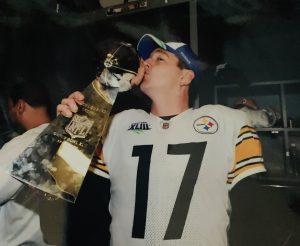 goals and three extra points. He also was steamrolled by the Cardinals’ Adrian Wilson while holding on a Jeff Reed field goal attempt in the third quarter that blew out Mitch’s back but drew a key first down for the Steelers on an unnecessary roughness penalty. On the strength of a Santonio Holmes touchdown catch off a Ben Roethlisberger pass with just 35 seconds to go, the Steelers came from behind to prevail 27-23 for the club’s sixth Super Bowl title. Dramatically, the victory came after two Arizona touchdowns in the fourth quarter from Mitch’s old ballboy back in Minnesota, Larry Fitzgerald Jr., off passes thrown by none other than Kurt Warner.
goals and three extra points. He also was steamrolled by the Cardinals’ Adrian Wilson while holding on a Jeff Reed field goal attempt in the third quarter that blew out Mitch’s back but drew a key first down for the Steelers on an unnecessary roughness penalty. On the strength of a Santonio Holmes touchdown catch off a Ben Roethlisberger pass with just 35 seconds to go, the Steelers came from behind to prevail 27-23 for the club’s sixth Super Bowl title. Dramatically, the victory came after two Arizona touchdowns in the fourth quarter from Mitch’s old ballboy back in Minnesota, Larry Fitzgerald Jr., off passes thrown by none other than Kurt Warner.
Hard to imagine given the long road he’d traveled to get there but Mitch Berger, the Canadian kid from North Delta who’d overcome long odds and just about every obstacle you can imagine was a Super Bowl champion for his dad’s hometown team with his entire family cheering him on from the stands. You couldn’t write a better fairytale ending to a story if you tried. And if someone does one day make a film out of Mitch’s story like they did for Warner, if there are any dry eyes left in the theatre, this final scene will take care of that.
 The Steelers’ Super Bowl celebration is playing out on the field—confetti, hugs, smiles, some tears, teammates, staff, media, and family of the players milling about. And then there is Mitch sprinting over to the edge of the stands where his family was cheering. They couldn’t get down to celebrate on the field because Mitch’s dad had difficulty moving around by that point owing to the Parkinson’s he was battling. Mitch bowls over a couple security guards, runs up the stands, and gives his dad the biggest bearhug you can imagine.
The Steelers’ Super Bowl celebration is playing out on the field—confetti, hugs, smiles, some tears, teammates, staff, media, and family of the players milling about. And then there is Mitch sprinting over to the edge of the stands where his family was cheering. They couldn’t get down to celebrate on the field because Mitch’s dad had difficulty moving around by that point owing to the Parkinson’s he was battling. Mitch bowls over a couple security guards, runs up the stands, and gives his dad the biggest bearhug you can imagine.
“I had never seen my father cry before. And my father was actually screaming he was crying so hard. I got to grab him and say, ‘Dad, I got you one. I got you one.’ Outside of my son MJ being born, it was one of the best moments of my life.”
If you need a minute after reading that, no one will hold it against you. There was barely a dry eye in the BC Sports Hall of Fame’s Hall of Champions last May when Mitch shared this story.
“I’d been training since I was six years old to be a kicker. I retired when I was 37. I did it for 31 years. And I had to grind the entire time from start to finish. The last three years, no one would call me for training camp. I’d be out on the field in Kits with a buddy, Chris Burns, throwing me underhands. In Arizona, I’d be out with my mom and my dad with Parkinson’s, throwing me underhands on a field in 110-degree heat and pretending I was on an NFL field because I had no one to work with. I was out there every week in case I got the call. The last three years I got one call each year. Each time I won the job. And I won a Super Bowl in one of those.”
 Mitch played one more season after that with the Denver Broncos. He retired after 15 NFL seasons and 187 regular season games played with seven teams, one of the longest careers ever by a Canadian in the NFL. He has since been recognized with induction into several halls of fame including the Tyler Junior College Sports Circle of Honor, the Delta Sports Hall of Fame, and the BC Football Hall of Fame, where he and his father are the only father-son duo inducted.
Mitch played one more season after that with the Denver Broncos. He retired after 15 NFL seasons and 187 regular season games played with seven teams, one of the longest careers ever by a Canadian in the NFL. He has since been recognized with induction into several halls of fame including the Tyler Junior College Sports Circle of Honor, the Delta Sports Hall of Fame, and the BC Football Hall of Fame, where he and his father are the only father-son duo inducted.
After working in sports radio and TV for TSN for several years, as well as owning and operating restaurants and night clubs in Vancouver and Victoria, these days Mitch lives full-time in Scottsdale, Arizona to be close to his son, MJ. Mitch and MJ’s mother, Bambi Lashell, met on the reality TV show Millionaire Matchmaker. They later married but are now divorced.
For Mitch, induction into the BC Sports Hall of Fame is the culmination of a remarkable path to the summit of his sport, a shared father-son dream come true.
“It feels awesome. It’s very humbling and it’s very gratifying. Not a lot of people do things that are remembered past their time. You see musicians and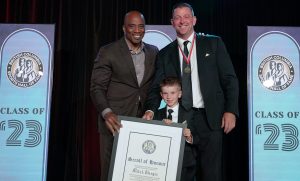 their music lasts forever after they’re gone. We’re still singing their songs. I know I played in some games that maybe will be shown on the old NFL channel once in a while, but it’s usually not my plays they’re showing. But this induction is about me and this is about my story and this is about the millions of balls that I kicked. And the tens of thousands of hours I put in healthy, injured, rehabbing, when nobody cared about me and nobody thought anything of me. This puts it all together and sort of shows the work that I put in and recognizes it. It feels good for everything I did and everything my dad sacrificed and there’s a reason I keep going back to him. I’m none of this without my dad. My dad made this all possible for me. It’s how I try to father my son, doing as much or more for him as my dad did for me. I lead by his example. Hopefully he’s looking down from above and I want him to see what we accomplished.”
their music lasts forever after they’re gone. We’re still singing their songs. I know I played in some games that maybe will be shown on the old NFL channel once in a while, but it’s usually not my plays they’re showing. But this induction is about me and this is about my story and this is about the millions of balls that I kicked. And the tens of thousands of hours I put in healthy, injured, rehabbing, when nobody cared about me and nobody thought anything of me. This puts it all together and sort of shows the work that I put in and recognizes it. It feels good for everything I did and everything my dad sacrificed and there’s a reason I keep going back to him. I’m none of this without my dad. My dad made this all possible for me. It’s how I try to father my son, doing as much or more for him as my dad did for me. I lead by his example. Hopefully he’s looking down from above and I want him to see what we accomplished.”
As part of the Class of 2023, Mitch Berger was formally inducted into the BC Sports Hall of Fame in the Athlete category at the annual Induction Gala held June 1, 2023 at the Fairmont Hotel Vancouver.